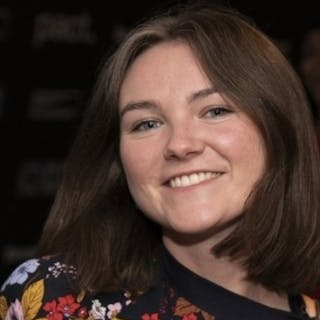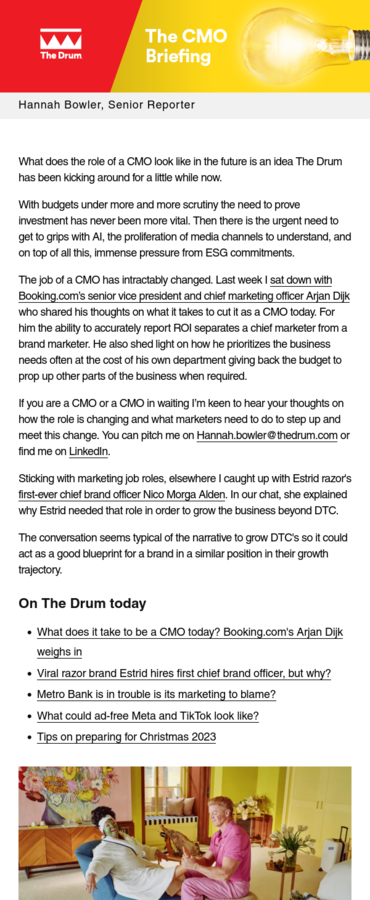The new non-negotiable marketing skills according to Booking.com CMO Arjan Dijk
Arjan Dijk has presided over Booking.com’s most significant campaigns to date and doubled brand awareness in the US. Now, the ex-Google global marketer sets out what it takes to cut it as a CMO today – hint its ‘numbers, numbers, numbers’.

Melissa McCarthy for Booking.com Super Bowl 2023
Booking.com has evolved from a hotel booking site to a global travel brand, with its most recent campaign with Hollywood actor Melissa McCarthy cementing its US presence. Behind the marketing engine is Arjan Dijk, senior vice-president and chief marketing officer for Booking.com.
The marketing boss opened up about how the role of a CMO has intractably changed and how marketers must adapt to leaner budgets and more scrutiny. According to Dijk, being able to quantify the impact you’re having on the business is vital to the job of a CMO today.
Advertisement
“People need to be good with numbers and cannot be thinking only in pictures,” Dijk says. If you are not good with numbers, “you need to only work as a brand VP or as a brand manager. You cannot work as a chief marketing officer,” he says.
Dijk says CMOs today should be able to go to their CEO, CFO, or board and say: “For this investment, on the basis of everything we know, we expect to get this return.” Concepts like incrementality, average ROI, or even marginal ROI are essential to understand.
“To have a seat at the table to be able to be very close to the chief financial officer, and then be able to go to the CEO together and say that this is the best plan that we can that we can get,” Dijk says.
Dijk has led Booking’s global marketing function for the past four years and earned his marketing credentials at Google, where he spent over a decade as vice-president of global marketing. Before that, he served at Unilever and Capital One.
Advertisement
Dijk’s approach as a chief marketing officer has been to prioritize business growth, sometimes at the cost of his own department.
“The key thing still in marketing is that it needs to drive the business growth of your company,” he explains. “A lot of marketers still need to make that pivot. You must really think through whether your product ready, is your price okay, and is your distribution good? And then you need to add a layer a level of marketing on top and a piece of advertising, and then it all falls together.”
There have been times he has stopped campaigns from running or even given budget back to the CFO if other parts of the business aren’t ready for the marketing to run. “It’s not always easy because people get carried away and want to launch,” he says. But if a product is not “completely ready,” he is prepared to hold.
At Booking.com, Dijk has a monthly review with the key product managers who jointly assess what’s the best thing for a business. “I obsess, for example, at looking at conversions, talking to a product manager, and seeing what we can do to make a mobile app better,” he says. “It sounds really obvious, but you’d be surprised how siloed sometimes things can be.”
Suggested newsletters for you
Use of AI in marketing
The job of the CMO is also to have an “open mind” about opportunities in the technology space. At Booking.com, Dijk’s marketing team is already using AI for asset and content creation, keyword generation, SEO, and on the consumer side for translation and writing hotel descriptions.
“In 2023, the most overused word is probably AI. Everyone talks about it in every other sentence, and I’m like, OK, what are you really doing?” Dijk asks. “I’m personally very obsessed about what we’re doing clearly with our customers but also, how can we improve the way we go to market and any options and opportunities there in terms of content moderation.”
Dijk's marketing strategy
Dijk’s laser-focused approach to proving the value of his investment has translated into Booking.com looking at the role of marketing in three buckets: high, medium, and low intent marketing.
Low-intent marketing is aimed at people who aren’t currently booking a trip but if asked to name a few travel brands, then Booking.com should be recalled. This is where Booking’s big-budget brand campaigns come into play, signing up A-listers Idris Elba and, more recently Melissa McCarthy.
“It serves really the purpose of having that kind of overall brand awareness and consideration,” Dijk says. Booking.com has more than doubled brand awareness in the US in the past year after McCarthy’s campaign.
While brand advertising that is less measurable plays a key role for Booking.com, Dijk says 95% of its marketing is accountable (medium and high intent). “We really look at numbers, numbers, numbers, numbers, and it doesn’t mean, again, that we’re only looking at conversions in our mobile app, any marketing campaign needs to make you feel something, learn something, or do something. But you can put objectives and numbers around that,” he says.


